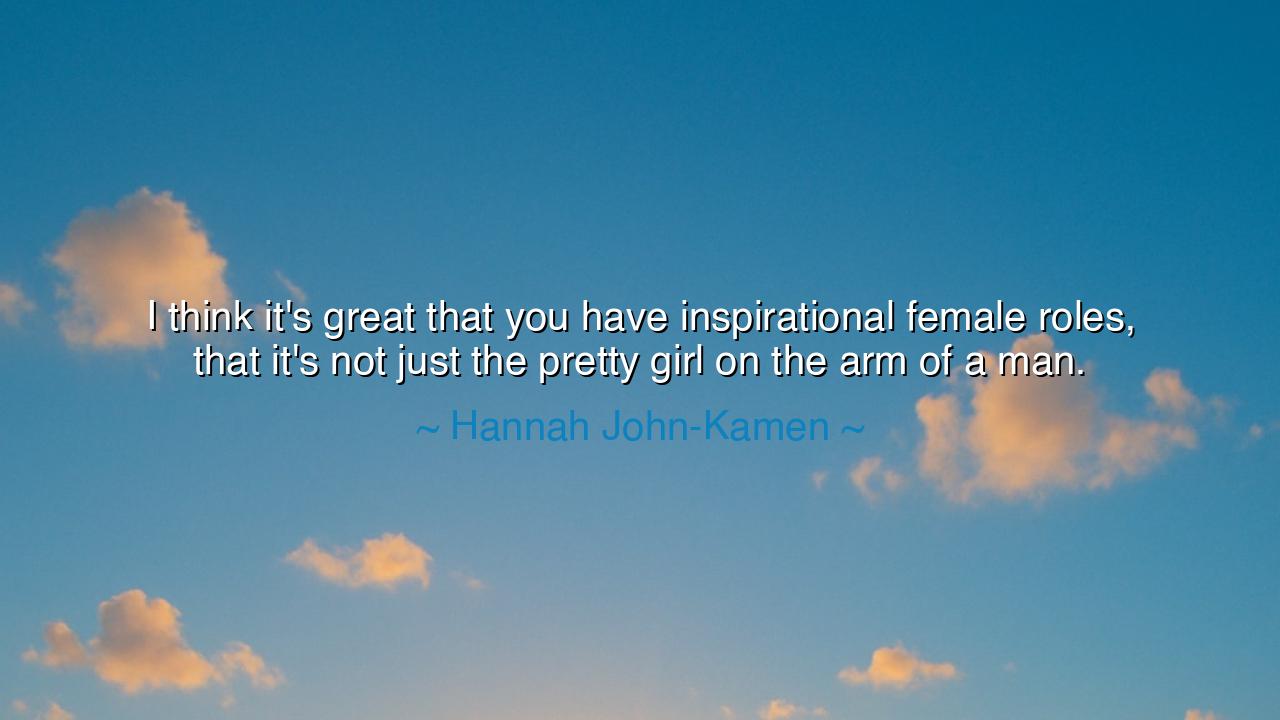
I think it's great that you have inspirational female roles, that
I think it's great that you have inspirational female roles, that it's not just the pretty girl on the arm of a man.






When Hannah John-Kamen declared, “I think it’s great that you have inspirational female roles, that it’s not just the pretty girl on the arm of a man,” she spoke with the fire of a new dawn — a voice echoing across centuries of silence. Her words carry the resonance of generations who waited to see themselves not as adornments, but as architects of destiny. In that single sentence lies both celebration and rebellion: the joy of progress and the defiance of limitation. It is the cry of every woman who has ever said, “I am more than the reflection of another’s story — I am my own.”
In the ancient world, there were goddesses of wisdom and war, of hearth and harvest — Athena, Isis, Mulan, Boudicca — women who shaped empires and defied fate. Yet, through the long night of history, their divine images were softened, their voices dimmed. Women were written as muses, not makers; as beauties to be admired, not heroes to be followed. When Hannah John-Kamen speaks of inspirational female roles, she is invoking the return of those ancient fires — the restoration of women to their rightful thrones in the human story.
Her words reflect not only a shift in art, but a transformation of consciousness. For what we see in our stories becomes the mirror of what we believe is possible. A child watching the screen learns who they might become. When the only image of womanhood is the pretty girl on the arm of a man, the message is clear: her worth lies in her proximity to power, not in her possession of it. But when we show women who lead, who fight, who build, who rise — we awaken generations to the truth that strength, intellect, and vision know no gender.
Consider the life of Katharine Hepburn, who defied the norms of her time. She refused to bow to the Hollywood mold of fragile femininity, choosing instead to portray women who were witty, determined, and gloriously independent. Through her roles, she taught millions that grace need not mean submission and that beauty could walk hand in hand with audacity. She was a living embodiment of what Hannah John-Kamen now celebrates — the woman who does not wait to be chosen, but who chooses her own path.
The origin of John-Kamen’s insight lies in her own journey through the world of performance — a world long dominated by archetypes written through the male gaze. To witness change within that realm is to glimpse evolution itself: where once the heroine’s worth was measured by her love interest, now it is measured by her courage, her vision, her inner fire. Through roles in science fiction, fantasy, and drama, John-Kamen and her peers have reclaimed the stage, showing that the female spirit can be just as commanding, complex, and flawed as any man’s — and often, more enduring.
Her words also strike at a universal truth that reaches beyond gender. They remind us that no person should live as the side character in their own life. To exist merely as decoration is to deny the spark of creation that burns within each soul. Every human being is called to their own quest — to seek meaning, to act, to rise. And in celebrating inspirational female roles, John-Kamen is calling us all — men and women alike — to live as protagonists in the grand tale of our existence.
From her wisdom emerges a lesson for all ages: representation is not vanity; it is vision. The stories we tell shape the world we build. Therefore, create stories — in art, in life, in your daily choices — that uplift rather than diminish, that empower rather than conform. Teach your daughters not only to dream, but to command. Teach your sons to honor strength in every form it takes. Let your own life become a story where no one stands merely at another’s side, but walks boldly forward into their own light.
For when every person stands in their truth — when women are no longer confined to the role of beauty but are free to embody wisdom, courage, and creation — then the world itself grows larger, richer, and more whole. The ancients would have called such a time a golden age, not of conquest, but of equality. And in that age, the words of Hannah John-Kamen will ring as prophecy fulfilled: that humanity, at last, has learned to see beauty not as ornament, but as power in motion — the power to inspire, to lead, and to transform the story of us all.






AAdministratorAdministrator
Welcome, honored guests. Please leave a comment, we will respond soon